On October 23, the National Assembly discussed in the hall a number of content with different opinions in the draft Law on Juvenile Justice. Delegates basically appreciated the quality of the draft Law, but requested to clarify specific articles and clauses to ensure the requirements of progress, humanity, and friendliness in resolving cases related to juvenile offenders.
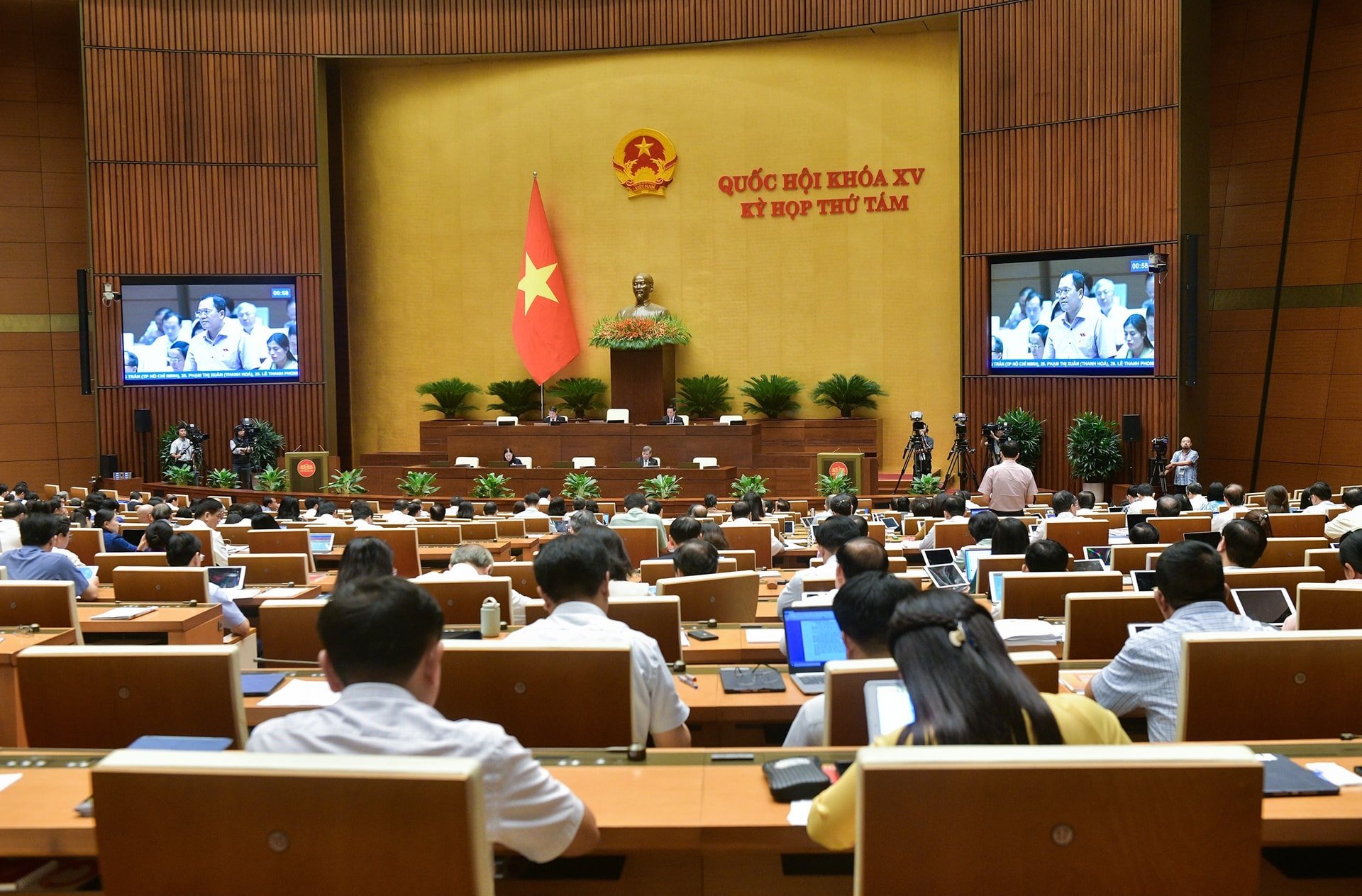
At the meeting, Ms. Le Thi Nga - Chairwoman of the National Assembly's Judicial Committee reported on the explanation, acceptance and revision of the draft Law on Juvenile Justice. Accordingly, regarding the educational measure at reformatory schools (Article 52), Ms. Nga said that many opinions agreed with the provisions of the draft Law on converting the judicial educational measure at reformatory schools stipulated in Article 96 of the Penal Code into a diversionary measure. There were opinions suggesting considering this measure because sending a juvenile to a reformatory school also deprives them of some of their freedom.
Regarding the above issue, the National Assembly Standing Committee expressed its opinion: Before 2015, the Penal Code stipulated two judicial measures applied to juvenile offenders (including: educational measures at communes, wards, and towns and educational measures at reformatory schools). Because they are judicial measures, these two measures can only be applied after the Court of First Instance has tried and issued a verdict. At that time, juvenile offenders may have been detained in all three stages (investigation, prosecution, trial) and the detention period can be up to nearly 9 months for serious crimes and nearly 12 months for very serious crimes.
When amending the Penal Code in 2015, the National Assembly decided to change the judicial education measure at communes, wards and towns into supervision and education measures (essentially a diversion measure as in the draft Law); and now the draft Law on Juvenile Justice continues to propose changing the judicial education measure at Reformatory Schools into diversion measures. These proposals are all aimed at "in the best interests of juveniles" but still ensure safety for the community and for the victims because Reformatory Schools are strictly disciplined educational environments directly managed by the Ministry of Public Security . At that time, juveniles will be placed in Reformatory Schools right from the investigation stage and the prosecution process will be concluded soon; the detention period of juveniles will be significantly shortened; and the interruption of the juvenile's right to study and vocational training will be minimized.
Responding to the requirements of Article 40 of the International Convention on the Rights of the Child, "whenever appropriate and necessary, measures should be proposed to deal with children who violate criminal law without having to use judicial procedures"; "Incorporating the opinions of many National Assembly deputies, we propose that the National Assembly retain the provisions of the draft Law on education at Reformatory Schools as a diversionary measure, and at the same time coordinate to carefully review each case where this measure is applied to ensure strictness (in Article 52)" - Ms. Nga said.
According to Deputy Pham Van Hoa (Dong Thap National Assembly Delegation), the draft Law stipulates educational measures at reformatory schools (Article 52), which is consistent with the current reality in our country. Accordingly, when violating the law, minors can be detained at all three stages, and the detention period can be up to nearly 9 months for serious crimes and nearly 12 months for very serious crimes. If within the scope of application, it should be redirected, instead of being brought to trial, to ensure the right to education and learning for minors.
Regarding the authority to apply diversion measures (Article 53), Mr. Hoa said that assigning the investigation agency and the Procuracy to decide to apply diversion measures as in the draft Law will ensure the principle of speed and timeliness, helping eligible minors to soon apply diversion measures instead of requiring the investigation agency and the Procuracy to prepare a dossier to request the Court to apply, which will both extend the time limit and create procedural problems.
According to Mr. Hoa, the police and the prosecutor's office discovered that the children had violated the law and proposed to change their course of action from the beginning. If the court were to change their course of action during this time, the juvenile's detention or release would also be greatly affected. Therefore, handing over the investigation to the police and the prosecutor's office is in line with the process and procedures very well.
Delegate Le Thanh Hoan (Thanh Hoa National Assembly Delegation) said that Article 40 of the draft Law stipulates that the juvenile must admit that he/she has committed a crime and agree in writing to the diversion. Although the juvenile may rely on the advice of his/her parents, guardians, or legal representatives, the final decision to plead guilty or not to plead guilty still depends on the juvenile himself/herself.
In addition, according to Mr. Hoan, the young are not considered to have full autonomy in decision-making, including smoking, drinking alcohol or not having the right to decide to vote in an election, while they are pressured to decide to admit to committing a crime without really being aware enough to know what a crime is. This is consistent with the approach that the young are people who do not have full capacity for civil conduct.
“It is necessary to supplement processes and procedures to ensure that decisions to admit to crimes are made voluntarily and clearly by the juvenile, without coercion, such as receiving legal aid or meeting a lawyer to defend themselves before the juvenile admits guilt. In addition, the application of measures to send the juvenile to a reformatory school also requires the consent of the juvenile, which is unreasonable, so it is recommended to consider removing this provision. In addition, it is necessary to clarify whether the measure of changing the handling of the diversion requires the consent of the juvenile or not,” said Mr. Hoan.
Deputy Nguyen Thi Viet Nga (Hai Duong National Assembly Delegation) said that Clause 1, Article 153 of the draft Law stipulates that "the examination of traces on the body of a minor victim must have the participation of their representative". Ms. Nga assessed that this is very necessary to ensure the rights of the victim who is a minor. At the same time, it is necessary to consider additional regulations on the consent of the minor victim himself if he is of a certain age, possibly 13 years old or older, to examine traces on the body, especially in sensitive and private areas and parts. This shows respect as well as avoids causing negative psychological effects on the victim who is a minor.
Deputy Truong Thi Ngoc Anh (Can Tho National Assembly Delegation) said that the draft Law fully reflects the Party's policy and the humane nature of the State in ensuring the rights and interests of juveniles. Regarding Article 37 on diversion measures, Ms. Anh proposed to remove the "reprimand" measure in Clause 1, because it is very difficult to apply in practice. If implemented, it is necessary to specify the participants, authority, and form of implementation. In Clause 8, it is recommended to study and supplement the provisions on exceptional cases in cases where the family of the person is banned from going to places that pose a risk of causing juveniles to commit new crimes. Such as in the case of having to change the place of residence to near areas according to the provisions of the diversion measure to ensure compliance with reality and ensure the effectiveness of the Law.
Regarding Article 42 on apologizing to the victim, Ms. Anh suggested that the phrase “and the local authorities where the juvenile offender resides and where the victim resides” should be added after the phrase “the representative of the juvenile offender”, because the apology requires the witness of the two local authorities. This is a provision to ensure local administrative management of the juvenile offender if there is a recidivism.
On the same day, the National Assembly listened to Minister of Natural Resources and Environment Do Duc Duy, authorized by the Prime Minister, present the Proposal on the policy of adjusting the National Land Use Plan for the 2021-2030 period, with a vision to 2050. Reporting to the National Assembly, Mr. Duy said that according to the provisions of the 2024 Land Law, the Government will submit to the National Assembly to adjust the National Land Use Plan with the main contents including: Adjusting 8 land use indicators including: agricultural land group (including land types: rice land, special-use forest land, protective forest land, production forest land is natural forest); non-agricultural land group (including land types: defense land, security land); Not submitting to the National Assembly for approval the National Land Use Plan.
According to Mr. Duy, the calculation and determination of 8 land use indicators in the revised National Land Use Plan this time needs to be carefully reviewed and balanced with land use indicators of sectors, fields and localities. In particular, priority should be given to allocating land funds for national defense and security purposes, stabilizing rice land funds to ensure national food security, strictly managing forest land, maintaining forest cover to contribute to protecting the ecological environment, responding to climate change and achieving sustainable development goals.
Examining the above issue, Mr. Vu Hong Thanh - Chairman of the National Assembly's Economic Committee expressed that the Government's proposal to adjust the National Land Use Planning is in accordance with the National Assembly's requirements in Resolution No. 103/2023/QH15 dated November 9, 2023 of the National Assembly. "Therefore, I agree with the necessity of adjusting the National Land Use Planning," Mr. Thanh said.
Source: https://daidoanket.vn/nguoi-chua-thanh-nien-vi-pham-phap-luat-nen-duoc-xu-ly-chuyen-huong-thay-vi-dua-ra-xet-xu-10292936.html





![[Photo] Keep your warehouse safe in all situations](https://vphoto.vietnam.vn/thumb/1200x675/vietnam/resource/IMAGE/2025/10/1/3eb4eceafe68497989865e7faa4e4d0e)








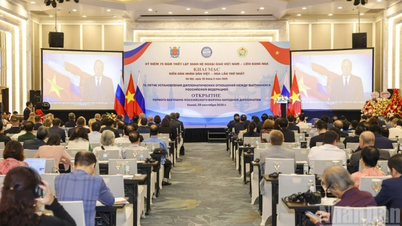

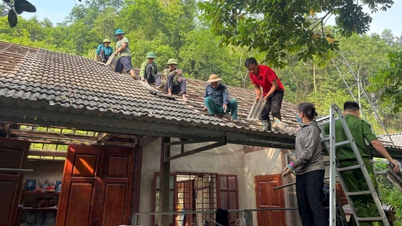













![[Photo] President of the Cuban National Assembly visits President Ho Chi Minh's Mausoleum](https://vphoto.vietnam.vn/thumb/1200x675/vietnam/resource/IMAGE/2025/10/1/39f1142310fc4dae9e3de4fcc9ac2ed0)













































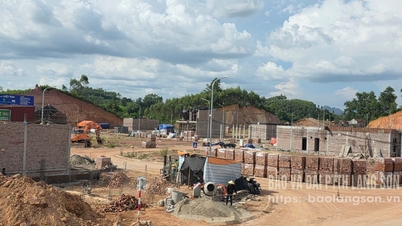
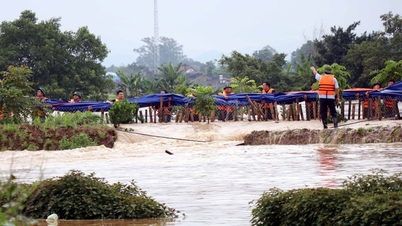
















Comment (0)